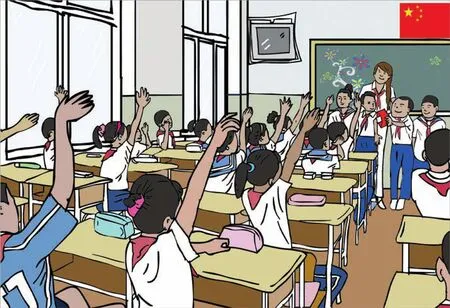Is It Time to Cancel Class Councils?
2012-10-14本刊编辑部
Is It Time to Cancel Class Councils?

LI SHIGONG
In China’s primary and middle schools as well as colleges, every class has its class council which is composed of several student members in charge of affairs such as study, publicity, sports, organization, helping teachers with general class management work.
In a primary school in Chengdu, southwest China’s Sichuan Province, the current class council system is undergoing reforms:Everyone in the class is responsible for a speci fi c item of class management work. The school said that this reform aimed to offer every student the opportunity to practice and develop the ability to do class management work, apart from daily academic work.
Not long ago, Zheng Yuanjie, a famous author of children’s literature, openly expressed his opposition to China’s class council system in his micro-blog, arguing that this system will exert a negative impact on children’s personality development, triggering discussions on whether the current class council system should be canceled.
Most teachers and parents are against the cancellation of this system. Teachers believe that when a student serves as a class council member, he or she will behave in a more responsible way, and when one’s management ability improves, his or her self-con fi dence will also grow. Shouldering part of class management work will help students develop the ability to communicate with others and deal with various situations. Comparatively, a student who has the experience of class management work is generally more capable in dealing with other issues.
A good tradition
Wei Guohua (Guangming Daily): From the perspective of education and sociology,the current class council system in primary and middle schools is bene fi cial. In China,every class has dozens of students, and thus teachers have to spend quite a lot of time managing class affairs. But teachers’ energy is limited and in this sense, class council members become assistants to help teachers deal with class affairs. Meanwhile, the class council system is also an invisible force to demand council members to control and educate themselves. During the tenure, these students are able to improve their ability in communication, management and helping others.
Lu Hao (www.xinhuanet.com): In China, class council members are teachers’assistants, and so without them, teachers will be plagued by endless tiny class duties.Thus they might not have enough time to spend on teaching work. Canceling the class council system seemingly will bring a fair result, but actually it is unfair to those capable students if their management ability is restricted from playing a role in school life just for the sake of fairness. If those students miss the practice opportunity in primary school period, it’s difficult to develop the ability in middle school and their teachers will lose good assistants.
A class is just like a mini society, which must be operated in certain order, or a class will fall into a mess. While class council members help teachers to manage class affairs, they all share the same goal, that is, to offer their classmates convenient and good services. This does not mean privilege or power. The class council members will also be blamed or punished if they make mistakes. Everyone is equal in front of class and school disciplines.
Wang Zhehong (www.xinhuanet.com):Canceling class council system is not a wise idea. First of all, admit it or not, some children are better than others in organizing events or dealing with class affairs, some are only good at academic work, and some are not good at either of them. This is the same in society.There are always differences in people’s capabilities.
Whether the class council system is good or bad depends on how it is operated. If all student leaders are selected by teachers according to his or her personal preference, then the system will surely bring terrible consequences. The best way is to let students themselves to choose their class council members. The council members are not necessarily those who do the best in schoolwork or most capable, but those who are really willing to help others and serve others. While running for the election, the focus should be on “what kind of ability I possess and what I can do for my classmates,” and so all students will be encouraged to love the class and feel ready to help others.
To be a class council member, a student must learn to take responsibility for what he or she does. Our country needs such “managers”and “organizers” in its future development, so why not let schools offer students the opportunities to develop these abilities when they are young.
Canceling class council system is to a large extent a waste of human resources, because it makes it impossible for some capable students to fully display their managing and organizing abilities.
A hindrance
Hang Lin (www.newssc.net): The class council system has been existing in China for decades. In the past, the student council were composed of students who were good at academic work and obedient to their teachers, and once they were selected, they stayed in the position until the graduation day. Since the 1980s, class council member selection has undergone some reforms, but the traditional practice remained.
In 1991, Wu Kangning, a professor at Nanjing Normal University, made a survey on 1,470 Grade 6, fi nal year primary school,students, which shows that only 17 percent of these students have experience of being a class council member, and 55.2 percent of them stay at the position for five or six years; those who remain in the position for more than three years account for 87.2 percent. This survey shows that since Grade 3 of primary school, class council structure has basically taken a fixed shape. The result reveals that 83 percent of the surveyed students never had the experience of being a class council member during six years’primary school life.
Because of many realistic factors, Chinese schools always have big classes, so teachers cannot manage to deal with all the affairs,big or small. While dealing with class affairs,class council members sometimes play the role of teachers, so they surely will divert part of the teachers’ power.
Generally speaking, class council members enjoy relatively “higher or superior”status than ordinary students and they have much stronger sense of authority. Because it will endow them with certain power, students all rush to become a council member. This situation is not the fault of students, because the overall social environment favors “offi cials,” and “of fi cials” generally enjoy better treatment and more convenience in daily or social life.
Zeng Xi (Chengdu Business Daily):Modern society needs ordinary people to develop the sense of modern citizenship, and this is the development trend of a democratic society based on the rule of law. Against this backdrop, you might better understand why there are calls for cancelation of the class council system. The call is to protect children from the sense of “power and privilege.” They need to be encouraged to control themselves and try to manage their own affairs.
Why is the current class council system a hindrance to the development of modern citizenship sense? Because this system stems from China’s traditional feudalist concept.Even by now, Chinese students can only passively obey teachers’ orders, lacking the ability of dealing with their own issues. In a society where everyone is running after power and privilege, children will easily get affected by such an atmosphere. Such a system is going against the self-administrative modern citizenship.
What we are opposed to is the outdated class council system, but not students’ organizations. Students should manage their own affairs, with little interference from teachers. Every student, whether he or she is good at studying or not and whether his or her family is rich or not, has the opportunity of participation in class affairs management.
The final goal of education is to realize people’s overall development, and education must ful fi ll the obligation of providing qualified citizens of modern democratic concepts to societies. Thus, we should start the selfadministrative education from the very start in primary and middle schools.
